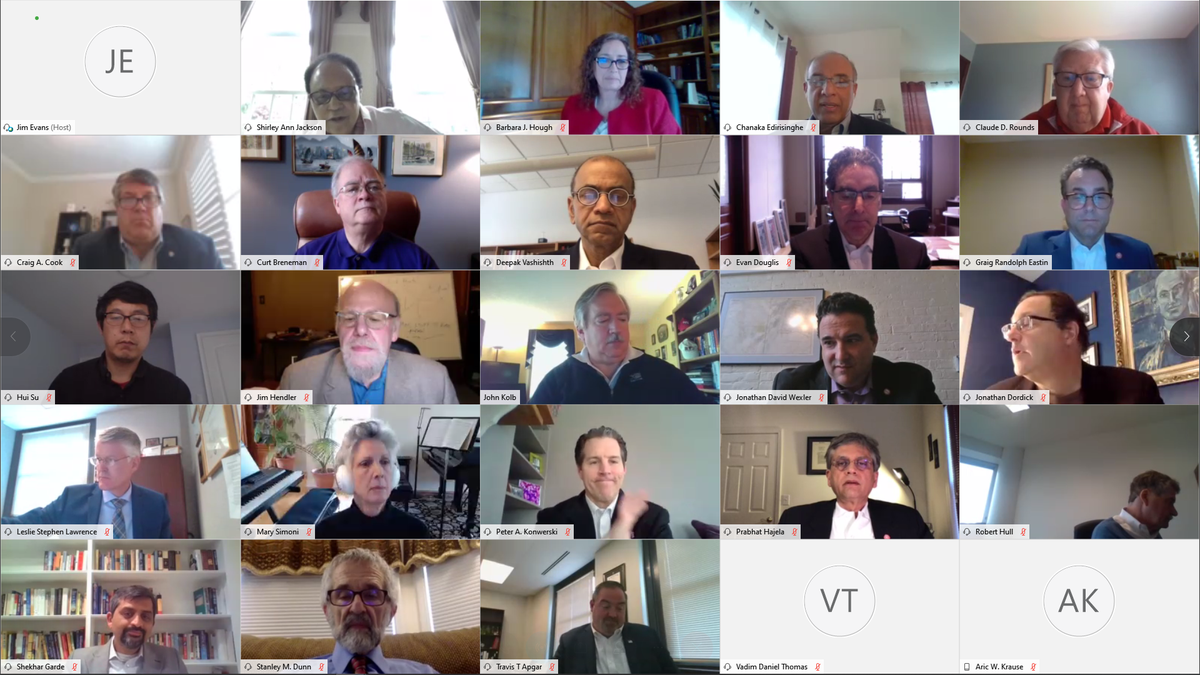Senate motions for tuition freeze and Institute COVID-19 budget transparency
The Student Senate approved a motion to recommend the Institute to consider a tuition freeze for the fiscal year 2021-2022 and for the Rensselaer to make budget information regarding COVID-19 to become public during the Student Senate meeting held on October 27.
A tuition freeze, as defined by Facilities and Services Committee Chair Cait Bennett ’22 is a “policy of not raising the tuition” due to the “financial impact that COVID-19 has had on students and Rensselaer families, and because of the students feeling that there’s been a decrease in the value of the RPI experience due to limitations of COVID-19.” Bennett’s motion was seconded by Greek Senator Remi Kirrene ’21 and passed 22-1-1. Graduate Senator Zachary Barringer voted against the motion as a whole and Graduate Senator Neha Keshan abstained from the vote.
Bennett elaborated that Rensselaer is currently in the fiscal year 2020-2021, which starts on July 1 and goes to June 30 of next year. As such, the motion is asking for a tuition freeze for fiscal year 2021-2022. “Summer 2021, Fall 2021, and then Spring 2022 that we’re asking for the tuition rate to remain the same as it is right now,” explained Bennett.
The motion also expressed the desire for transparency between the Institute and students: “To strongly encourage the RPI administration to make all budgetary information relating to COVID-19 public, in the interest of transparency.” According to Bennett, this is because “We do hear a lot about how the Institute is really struggling financially due to extra costs from COVID-19, but we’ve only heard really the big picture,” said Bennett, referencing the $65 million in pandemic-related revenue losses and unplanned expenses, mentioned by President Shirley Ann Jackson during the town meeting held in October. In response to later discussion on what transparency entails, Bennett said “you can relate it similar to how we have the Union Annual Report. It’d be really great to have something similar to that where we can see where all of this money is going to and where specifically it’s being spent.”
In response, Vice President of Student Life Peter Konwerski emphasized that part of the university’s financial struggles is to allocate Rensselaer resources to best serve student needs, and that the Institute has yet to make a decision on tuition. In terms of the Institute’s tuition decision process, Konwerski stated that “it’s like any budgeting process. You’re looking at the future and it’s not a secretive process. We will always talk with students about it, but… it usually happens in the early fall. We make a decision and make a recommendation. It’s then taken forward to the kind of senior administration and that goes to the board in the spring and then it’s usually voted on and then it’s announced...in the spring, like, in March, April timeline.”
Konwerski also told the Senate “to be conscious of the schools that” that the motion is comparing the Institute to in reference to the motion citing “peer and aspirant institutions, such as Lehigh University, Drexel University, Harvard University, Massachusetts Institute of Technology and the University of Rochester,” who “have implemented tuition freezes as part of their COVID-19 fiscal response.” Konwerski stated “we do that same benchmarking but every school looks at a different set of factors and obviously some are better endowed that us, some have different resources, and some are not even open this fall.” He added “I think we want to work together and we always want to be as collaborative as possible and anytime I see words like denounce or demand, I think that those are not the healthiest words ...I don’t think it actually helps with the spirit of what you’re trying to accomplish, which is, we ultimately want to be as open and collaborative and work together.”
Remi Kirrene ’21 responded that she noticed Konwerski emphasized the desire to have open dialogue with students “but I know I was not aware of the tuition raise and anything about the tuition raise before, I just noticed it on my bill, so that … doesn’t make it feel like we’re included at all in the conversation.”
Barringer questioned the wording of “decrease in value to the RPI experience” in the motion. Bennett explained that this was in reference to the “decrease in resources [available to RPI students]” such as having “online or hybrid classes, limited access to on-campus resources, such as the library, dining halls, lecture halls, lab spaces and transportation.” Barringer commented that he doesn’t necessarily agree with the decreased value part, as he said “but this does seem to me to be neglecting the value of getting an education safely.” Class of 2024 Senator Talulah Patch emphasized that “there was a direct monetary effect of COVID-19 beyond the arbitrary devaluation of education.” Patch continued: “I know I personally lost financial aid due to the fact that work study were closed, and I got no say in that. That, paired with an increase in tuition, is even more damaging.”

 Town Meeting
Town Meeting
 Academics
Academics